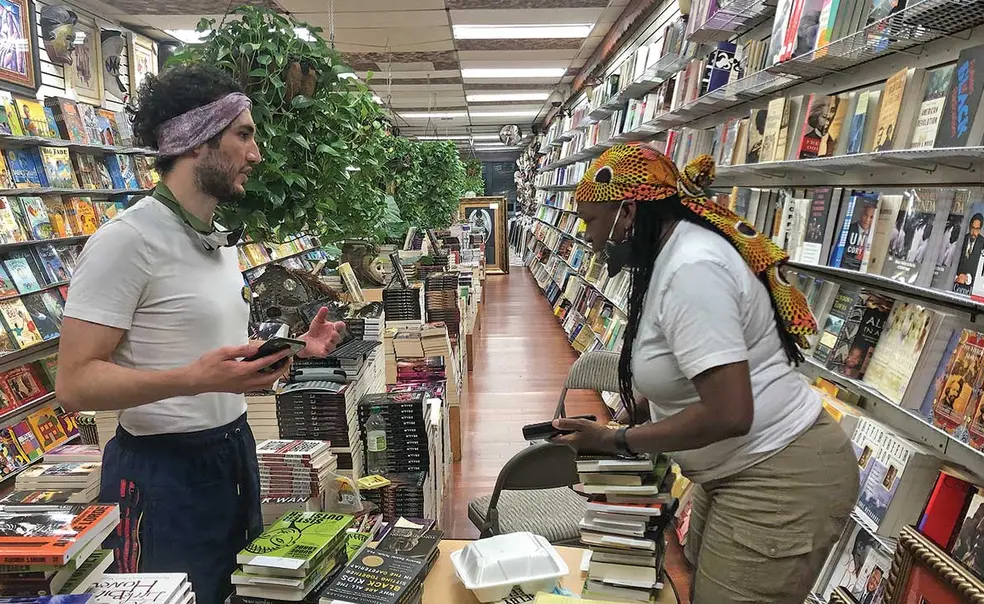Alumni Start Movement to Lift Up Black-Owned Bookstores
A new collective seeks to educate while also funding Black authors and booksellers
Watching the nationwide protests after the death of George Floyd, Edwin Rosales ’17 wondered what to do to support the emerging movement. In particular, Rosales — who was an aspiring playwright in the first year of graduate studies at the Yale School of Drama at that time — wondered how the growing trend of people buying “anti-racist” literature could be used to help Black communities more directly. Then, Rosales had an epiphany.
“I was thinking, what can I do? What can I do with my access to these privilege networks? ... All my friends who love literature, what can we do?” Rosales started gauging the interest of friends about whether they would commit to buying a work of Black literature from a Black-owned bookstore every month. “And there was a lot of excitement for the idea,” Rosales says.
Thus began Turn The Page: A Movement to Lift Up Black-Owned Bookstores (TTP), a collective Rosales co-leads with three others — Abigail Jean-Baptiste ’18, Tyler Cruz, and Malia West. The group has partnered with Source of Knowledge, a Black-owned bookstore in Newark, New Jersey, to ensure that the burgeoning interest in anti-racist literature during the protests over the summer also empowers the communities that most directly feel the impact of systemic racism. The goal is to get people to “decolonize their bookshelves,” as Rosales says, both in the literature people read and the ways they buy books.
Working with the owners of Source of Knowledge, TTP curates collections of books by Black authors that illuminate the Black diasporic experience in ways that can help readers better understand the racial reckoning happening across the nation. Those lists offer a variety of genres, from history to poetry, from an anthology of criminal-justice essays edited by Angela Davis to prize-winning dramas by Branden Jacobs-Jenkins ’06. Readers can then order books from the collection directly from Source of Knowledge by phone or email.
Rosales says buying from Black-owned bookstores and reading Black authors helps create an economic shift. “You move the capital from one community to another one. Amazon specifically was doing very well during the pandemic, but a lot of small businesses, such as Source of Knowledge, were struggling and were facing economic barriers,” Rosales says.
Read about an "anti-racist" reading list circulated by Princeton students
The partnership with TTP has been a boon for Source of Knowledge. After three decades in business, the bookstore almost had to close earlier this year when the shutdown due to the COVID-19 pandemic decimated its in-store sales. Since June 2020, the collaboration with TTP has generated $25,000 in revenue with more than 1,300 books shipped to readers in 34 states.
“We were at no sales,” says Masani Barnwell, co-owner of Source of Knowledge. “They really helped to open up a new market of people — that’s really going to help us survive. We all need to help each other, and it’s beautiful that’s [TTP’s] mission.”
TTP is evaluating the ways that it can grow as both a collective and a partnership with Source of Knowledge. The group has raised $3,000 to support a literacy initiative for the Newark community called Read and Feed, which will invite children from the Newark region to hear local authors read from their works. During the readings, the kids will receive a complimentary hot meal and two or three free books.
In August, the collective launched its website (www.turnthepagemovement.org). Since June, the group’s collections of recommended readings and purchasing instructions primarily have been promoted via the group’s Facebook page and Instagram account (@turnthepagemovement). As the collective considers ways to expand its influence and audience, the group’s leaders are determined to keep it a grassroots movement.
“I see Turn The Page as a way to bridge people’s access to and connections with Black literature, so that we can all re-imagine a future of racial justice and Black liberation,” says Jean-Baptiste. “While I think Turn The Page has a national importance and has endless potential for growth, our philosophy is to go slow, never forgetting the communities we are partnering with.”
“We call it a movement because this is a daily commitment,” Rosales says. “Every single day, you need to be figuring out how to be an ally to the Black community and how to involve Black liberation work in your everyday lives.”











No responses yet